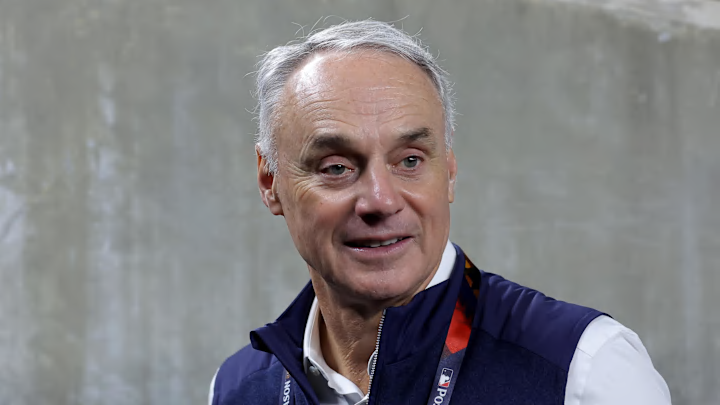The NBA, NFL, and NHL all share one critical feature — a salary cap, which helps level the playing field across teams, regardless of market size. However, Major League Baseball continues to operate without one, a point of contention that Commissioner Rob Manfred may no longer be able to avoid as fan pressure mounts.
In a recent poll conducted by MLB Trade Rumors, more than 30,000 fans weighed in on the issue of implementing a salary cap in the league’s next collective bargaining agreement (CBA). A decisive 67 percent voted in favor of the change, signaling a clear call for reform.
The disparity in spending power between teams in larger markets and smaller markets has become increasingly apparent. The Los Angeles Dodgers have emerged as the poster child for unchecked payrolls, routinely signing players to record-setting contracts with minimal financial repercussions. For example, Shohei Ohtani’s unique deal with the Dodgers, which defers nearly half its value over the next decade, has given the team the flexibility to sign other top-tier free agents like Tanner Scott and Roki Sasaki — contracts smaller-market teams could only dream of offering.
Meanwhile, New York Mets owner Steve Cohen raised eyebrows by handing Juan Soto a jaw-dropping 15-year, $765 million contract this offseason. The magnitude of this deal was so staggering that only the New York Yankees even entertained offering something comparable. This financial freedom has allowed the formation of “superteams,” where franchises with larger budgets stack their lineups with elite talent, leaving smaller-market teams struggling to compete.
The result? A widening gap in competitiveness has already started to alienate fans. Nearly 25 percent of MLB teams faced attendance challenges last season, largely because their owners were unwilling— or unable — to spend on marquee players that drive ticket sales and generate excitement.
Manfred recognizes the success of MLB’s recent season, much of which is owed to the Dodgers’ deep pockets. However, that same financial imbalance threatens the long-term integrity of the league. Introducing a salary cap — or at least a salary floor — could prevent teams like the Dodgers, Yankees, Mets, and Phillies from creating lineups that resemble something out of a video game.
The MLB’s current CBA expires in 2026, with existing terms already addressing minimum salaries and minor league improvements. If Manfred fails to address these growing concerns about payroll disparity, the league could face a contentious renegotiation period, potentially delaying any agreement and, more significantly, the start of a new era in baseball.
The stakes are clear: either MLB adapts to address the financial imbalance, or it risks further alienating its fanbase, undermining what has long been celebrated as America’s pastime.
